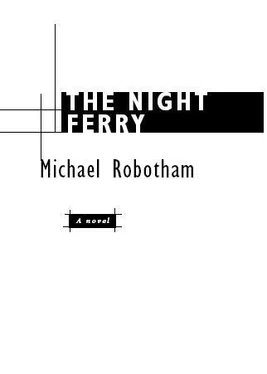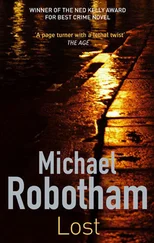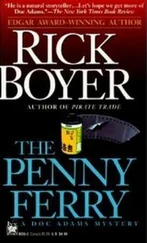Traders yell over one another.
“Fresh carnations. Two-fifty a bunch!”
“Live mussels!”
“Garden tomatoes as red as your cheeks!”
I can’t see Donavon but I recognize his stall. Draped from the metal framework there are dozens of intricate necklaces or perhaps they’re wind chimes. They twirl in the light breeze, fragmenting the remains of the sunlight. Beneath them, haphazardly displayed, are novelty radios, digital clocks and curling tongs from Korea.
Carla looks cold and bored. She’s wearing red woolen tights and a short denim skirt stretched over her growing bump.
I close the gap between us and slide my hand under her sweater, across her abdomen until I feel the warmth of her skin.
“Hey!”
I pull my hand away as if scalded. “I just wanted to be sure.”
“Sure about what?”
“It doesn’t matter.”
Carla looks at me suspiciously and then at Ruiz. A faint, fast vibration is coming off her, as though something terrible and soundless is spinning inside.
“Have you seen him?” she asks anxiously.
“Who?”
“Paul. He hasn’t been home in two days.”
“When did you last see him?”
“On Saturday. He had a phone call and went out.”
“Did he say where?”
“No. He never leaves it this long. He always calls me.”
Female intuition is often a myth. Some women just think they’re more intuitive. I know I’m letting the sisters down by saying that, but gender isn’t a factor. It’s blood. Families can tell when something is wrong. Carla’s eyes dart across the crowd as though assembling a human jigsaw puzzle.
“When are you due?” I ask.
“Christmas.”
“What can you tell me about the New Life Adoption Center?”
Her mouth seems to frame something she’s too embarrassed to admit. I wait for her.
“I don’t know what sort of mother I’m gonna make. Paul says I’ll be fine. He says I learned from one of the worst so I won’t make the same mistakes our mum did.” Her hands are trembling. “I didn’t want an abortion. It’s not because of any religious thing. It’s just how I feel, you know. That’s why I thought about adoption.”
“You went to see Julian Shawcroft.”
“He offered to help me. He said there were scholarships, you know. I always wanted to be a makeup artist or a beautician. He said he could arrange it.”
“If you gave up the baby?”
“Yeah, well, you can’t do both, eh? Not look after a baby and work full-time—not without help.”
“So what did you decide?” asks the DI.
Her shoulders grow rounder. “I keep changing me mind. Paul wants me to keep it. He says he’ll look after us all.” She gnaws at a reddened fingernail.
A crew-cutted teenager stops and picks up a transistor radio shaped like a Pepsi can.
“Don’t waste your money—this stuff is shite,” says Carla. The youth looks hard done by rather than grateful.
“How did you hear about the New Life Adoption Center?”
“A friend told Paul about it.”
“Who?”
Carla shrugs.
Her mauve-tinted eyelids tremble. She doesn’t have the wherewithal to lie to me. She can’t see a reason. Glancing above her head, I notice the feathers and beads.
I have seen one of these ornaments before—at Cate’s house, in the nursery. It was hanging above the new cot.
“What are they?” I ask.
Carla unhooks one from the metal frame above her and hangs it from her finger, watching me through a wooden circle crisscrossed with colored thread and hung with feathers and beads.
“This is a dream catcher,” she explains. “American Indians believe the night air is filled with dreams, some good and some bad. They hang a dream catcher over a child’s bed so it can catch dreams as they flow by. The good dreams know how to slip through the holes and slide down the soft feathers where they land gently on the child’s head. But the bad dreams get tangled in the web and perish when the sun comes up.”
Blowing gently, she makes the feathers bob and swirl.
Donavon didn’t go to the reunion to “make his peace” with Cate. He had seen her before. He gave her a dream catcher or she bought one from him.
“How well did your brother know Cate Beaumont?”
Carla shrugs. “They were friends, I guess.”
“That’s not possible.”
She bridles. “I’m not lying. When Paul was in the Paras, she wrote to him. I seen the letters.”
“Letters?”
“He brought them home from Afghanistan. He kept her letters.”
I hear myself quizzing her, wanting to know the where, when and why, but she can’t answer for her brother. Trying to pin her down to specific dates and times makes her even more confused.
Ruiz intervenes and I feel a twinge of guilt at having browbeaten a pregnant woman who’s worried about her brother.
The afternoon sun is sliding below rooftops, leaving behind shadows. Stallholders are shutting up, loading wares into boxes, bags and metal trunks. Buckets of ice are tipped into the gutter. Plastic awnings are rolled and tied.
After helping Carla load up the red Escort van, we follow her home. The house is still empty. There are no messages waiting for her on the answer phone. I should be angry with Donavon, yet I feel a nagging emptiness. This doesn’t make any sense. Why would Cate write letters to someone who sexually assaulted her? She was talking to him the night of the reunion. What were they saying?
Ruiz drops me home. Turning off the engine, we stare at the streetscape as if expecting it to suddenly change after more than a century of looking almost the same.
“You want to come in?”
“I should go.”
“I could cook.”
He looks at me.
“Or we could get takeaway.”
“Got any alcohol?”
“There’s an off-licence on the corner.”
I can hear him whistling his way up the street as I open the front door and check my answering machine. All the messages are for Hari. His girlfriends. I should double his rent to pay the phone bill.
The doorbell rings. It should be Ruiz—only it’s not. A younger man has come to the door, dressed in a pepper-gray suit. Clean-shaven with broad shoulders and Nordic features, his rectangular glasses seem too small for his face. Behind him are two more men, who are standing beside cars that are double-parked and blocking the street. They look official, but not like police officers.
“DC Barba, we need you to accompany us.” He makes a clicking sound with his tongue that might be a signal or a sign of nerves.
“Why? Who are you?”
He produces a badge. SOCA. The Serious Organized Crime Agency. The organization is less than a year old and the media have labeled it Britain’s answer to the FBI, with its own Act of Parliament, budget and extraordinary powers. What do they want with me?
“I’m a police officer,” I stammer.
“I know who you are.”
“Am I under arrest?”
“Important people wish to speak to you.”
I look for Ruiz. He’s hurrying down the pavement with a half bottle of Scotch tucked in his coat pocket. One of the men beside the cars tries to step in front of him. The DI feints left and drops his shoulder, propelling him over a low brick wall into a muddy puddle. This could get ugly.
“It’s all right, sir.”
“Who are they?”
“SOCA.”
The look on his face says it all. Fear and loathing.
“You might want to pack a few things for the journey,” says the senior officer. He and Ruiz are sizing each other up like roosters in a henhouse.
I pack a sports bag with a pair of jeans, knickers and a lightweight sweater. My gun is wrapped in a cloth on top of a kitchen cabinet. I contemplate whether I should take it with me, but dismiss the idea as being too hostile. I have no idea what these people want, but I can’t risk antagonizing them.
Читать дальше












